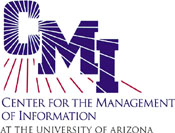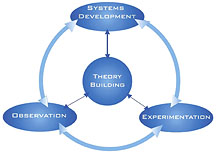

Center for the Management of Information (CMI)
The University of Arizona
A National Science Foundation Industry/University Cooperative Research Center since 1985
Furthering the art and science of collaboration, and redefining the way people do their work
Center Mission and Rationale
Through its research in collaborative technology, the Center for the Management of Information (CMI) develops the technology and applies advanced knowledge of group processes, enabling private and public sector work groups to conduct teamwork around the clock, around the globe. The CMI mission is to explore collaborative concepts by developing, testing, and implementing tools and methods to improve group outcomes. CMI focuses on the development and application of technology and group processes to support collaborative work. This research is supported by organizations with a common interest in the development of new technologies, best practices, education/training, sharing of new ideas, and insights on computer supported collaboration.
CMI was established in 1985 through sponsorship from a large information technology corporation. This funding, along with support from a variety of government and private sector organizations, has sustained the center. Partnerships with other research centers have been forged to create synergy and share knowledge. These partnerships broaden the spectrum of CMI's focus and stretch its research globally.
CMI has developed an international reputation for the development of collaborative processes and technologies, such as the award-winning GroupSystems(R) software. Under the direction of Dr. Jay F. Nunamaker, CMI researchers are working to make the virtual workspace and other technologies for distributed work teams a reality.
Research Program
CMI researchers investigate collaboration processes and technologies from both behavioral and technological perspectives. Researchers use quantitative and qualitative approaches to develop experiments and field studies to examine collaboration. CMI's research staff has been trained in a variety of disciplines: management information systems, cognitive psychology, organizational behavior, communication, computer science, library science, and engineering. These approaches allow CMI to address the complex issues associated with collaboration as an integrated team. The diagram shows the research approach used by CMI researchers.
Today, the traditional workplace is being transformed into a virtual workplace, no longer constrained by time and space. New computer technology has provided both massive horsepower for information access and the capacity for distributed, or virtual, collaboration and communication. But at the same time, with the advent of the Internet and the global economy, many people find themselves so connected to others that they are drowning in e-mail, phone, fax, and other communications. The bewildering abundance of information present in the communication environment is increasingly taxing people's ability to attend to what would actually make them productive.

|
Center Laboratories
As a result of this evolving business environment, CMI has established
three internal research labs: the Distributed Collaboration Lab,
the Knowledge Management Lab, and the E-Commerce Lab. Each
of these labs will address a different aspect of the future work environment
in order to establish fundamental new ways of doing distributed work,
to create collaborative applications that resemble the current work environment,
and create technologies and methodologies to sustain the work environment
of the future.
Distributed Collaboration Lab -- Inherent in the virtual environment is the idea of distributed processes and technologies. This research lab will study and build on the distributed nature of the future work environment so society can capitalize on processes, technologies, and methodologies that will create value in collaborative distributed environments.
Knowledge Management Lab -- The work environment of the future could generate insurmountable amounts of information. Knowledge management processes will provide a means for navigating amid that information using technologies that collect, store, retrieve, and display appropriate data to help an organization aggregate and manage knowledge.
E-Commerce Lab -- With the virtual environment comes the digital economy. E-commerce has allowed businesses to automate and digitize processes to become more efficient and gain competitive advantage. CMI's E-Commerce Lab studies and creates leading electronic processes.
Current Research Projects
CMI is currently involved in several research projects. Examples include Collaboratus, CommandNet, Vizard, and Learning By Asking.
Collaboratus is a Latin word, a form of collaborare, meaning "to work together". This name reflects the project's focus: to help teams work together more effectively to accomplish a task or goal.
Collaboratus is the first collaborative tool designed to take advantage of the Internet and Java technologies. Collaboratus architecture has been designed for on-the-fly server distribution, load balancing, and scalability through Jini distribution technology. As a result, Collaboratus is the most advanced collaborative tool available to support all modes of teamwork, whether teams work in the same time or the same place or not.
Collaboratus can be used to quickly generate brainstormed ideas from a group, and to shorten the length of time it takes to categorize the ideas. Teams can use this tool to produce quality documents with greatly enhanced productivity. Additionally, this tool helps groups manage information overload by providing planning and outlining tools and representations that make it easy to track team performance and to communicate among team members. Finally, Collaboratus can help reduce time spent in meetings, build consensus, and foster faster decisions of higher quality.
CommandNet. The objective of the CommandNet program is to use collaborative technologies to improve communication and shorten the OODA (Observe, Orient, Decide, and Act) Cycle for decision-makers. CommandNet helps the staff create a central clearinghouse for operational information that can influence the options developed by the staff and the decisions the commander makes.
Since 1996, CMI researchers have been integrated into the U.S. Navy's Third Fleet operations onboard the USS CORONADO, the COMTHIRDFLT Command Ship. During this time period, CMI researchers have developed a collaboration center for Civil Military Operations. One of their major goals has been to find ways to improve collaborative processes and technologies to make the staff more effective. During underway periods, the joint or coalition staff maintains a constant Battle Watch.
CMI developed CommandNet to bring the major operational and intelligence information into a single collaborative log that can be accessed by computers throughout the ship. Third Fleet staff and coalition officers from around the world use CommandNet to streamline communications, collaborate, and maintain a focus of effort that would not otherwise be possible.
Vizard. We are working to develop persistent visualization, a term we have coined to reflect an increasingly apparent need in asynchronous, distributed collaboration. We offer persistent visualization, emphasizing changes and de-emphasizing stable material, so that after an absence of 16 hours, a participant can return to the desktop and see with a glance how the situation has developed since the previous session. Our second objective is to integrate with text processing to demonstrate the effectiveness of visualization for task performance.
Our current core technology is multidimensional scaling, whereby we present a geometric display, in two or three dimensions, of the relationships between blocks of text. A second technology is hierarchical clustering, used to categorize blocks of text. Our third main technology is a Java user interface, which connects our analysis to users and other applications to enhance task performance.
Learning By Asking (LBA). Many barriers stand between people in disadvantaged communities and valuable knowledge in our society. Despite an overabundance of information, access remains problematic for many. We are creating a multimedia learning system to overcome the barriers of geography, economics, and currency of knowledge to provide easier methods for learning and sharing information. Such a system would provide an interactive student/teacher atmosphere where the teacher would be an automated expert in a subject area. An LBA system would present a video segment on a particular subject and the student would be given the opportunity to initiate discussion by asking verbal or textual questions. The systems would then return the relevant answer, simulating the advice of an expert.
An LBA system will provide a way to help communities share expert information assisting community development by using the system to inject a mentor from one community into another, similar community. By maintaining contact with a mentor even after that person moves on, an LBA system will allow the sharing of not only goals and objectives, but also ways to achieve them, across communities and generations.
Center Headquarters
Center for the Management of Information
University of Arizona
College of Business and Public Administration
P.O. Box 210108
Tucson, AZ 85721-0108
Tel (520) 621-2640 * Fax (520) 621-2641
Email: info@cmi.arizona.edu
Homepage: www.cmi.arizona.edu
Center Director: Jay Nunamaker
(520) 621-4475 * jnunamaker@cmi.arizona.edu
Center Evaluator: David A. Tansik
(520) 621-1710 * dtansik@bpa.arizona.edu
NSF 01-168w